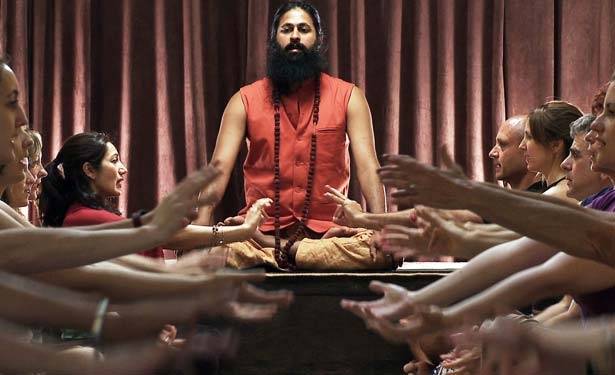Being raised in a religious home and not finding the solace in those beliefs that those around you find is difficult … and challenging … and alienating. You wonder why you don’t have the magic switch in your head that makes you believe there’s a higher power. You wonder why your prayers seem a waste of time and energy. You wonder if anyone really hears the voice of the Great and Powerful Oz, and if so, why can’t you? Growing up in a German Lutheran household, where it was assumed that you did hear that voice, was daunting. Careening from religion to religion to find that voice so I’d feel normal and whole was more so. The real problem, though, was faking it so those around my didn’t see my defect: “The God-shaped hole in your heart,” as one condescending evangelist from my past put it.
 Filmmaker Vikram Gandhi experienced a similar frustration growing up in his religious household. That frustration over never having that hole filled and his fascination with those who so desperately need it manifested into a social experiment in which he would set himself up as an imaginary guru to see if anyone bought it. The nuts and bolts of this experiment and the intriguing results of it have become the compelling and perplexing documentary, Kumaré, a mostly light-hearted exploration of faith and why we desire it so desperately.
Filmmaker Vikram Gandhi experienced a similar frustration growing up in his religious household. That frustration over never having that hole filled and his fascination with those who so desperately need it manifested into a social experiment in which he would set himself up as an imaginary guru to see if anyone bought it. The nuts and bolts of this experiment and the intriguing results of it have become the compelling and perplexing documentary, Kumaré, a mostly light-hearted exploration of faith and why we desire it so desperately.
“This story is the biggest lie I ever told and the greatest truth I’ve ever experienced,” states Gandhi in the opening moments of the film, and he does tell a whopper of a tale. A man of Indian heritage, he invents a persona of an Indian guru who comes to Arizona to set up shop in the affluent retreats of the young and yoga-obsessed amongst us. He enlists the aid of two female friends who bring legitimacy to his yoga exercises, and invents bizarre new exercises, such as the Kumaré Sutra and the more surprisingly effective, “Blue Light Meditation.” He spouts a philosophy that eventually morphs into “You are your own guru,” and wonders if the suckers will bite. And  bite they do. He soon has an adamant group of fourteen followers, and four true groupies: Kimberly, Greg, Stuart, and Emily. Some have funny reasons for gravitating to his teachings. One of the gentlemen confesses to making entire meals on supermarket samples and promises to stop reading his neighbor’s newspaper and then replacing it in their lawn after he’s done. Another follower blames her obesity on her lack of spiritual consistency. Still another blames her crappy finances on her lack of spiritual discipline.
bite they do. He soon has an adamant group of fourteen followers, and four true groupies: Kimberly, Greg, Stuart, and Emily. Some have funny reasons for gravitating to his teachings. One of the gentlemen confesses to making entire meals on supermarket samples and promises to stop reading his neighbor’s newspaper and then replacing it in their lawn after he’s done. Another follower blames her obesity on her lack of spiritual consistency. Still another blames her crappy finances on her lack of spiritual discipline.
With all of these, Gandhi nods and comforts and reflects back their own thoughts, as any spiritual counselor or shrink is programmed to do. And, TA-DA, things change, lives improve, and all of their successes are attributed to him. Gandhi’s gameplan is to eventually “unveil” to his followers his faux persona and to teach them that they had the truth inside them all along, Scarecrow … er, parishioner, er, yoga-ist … whatever. The point is, he plans to show them they’ve helped themselves. But then there are followers like Emily, who confesses an unhappy marriage and proceeds to dump her spouse and move across country to go back to school, as the gobsmacked faux guru looks on in wonder and horror. Soon Gandhi and his assistants are confronted by the very real lives he is impacting and manipulating, and the “Unveiling” becomes an angsty proposition at best.

This is a fascinating documentary of what we believe and how even false belief has a positive impact. After the “unveiling,” ten of the fourteen followers still speak to him, and most continue with his teachings even though many of them were made up on the spot. The documentarian’s angst over his punch line revelation seems a bit forced and stupidly naïve, but his stance that we are our own guru does hold true. It’s all very light-hearted and fun, with a good dose of thought, just like The Wizard of Oz. In Oz, when the Great and Powerful is revealed to be a doddering old man behind a curtain, no one lights a torch or raises a pitchfork because he’s outta there on the next hot air balloon. Maybe the followers in Kumaré are overwhelmingly supportive because they have found their Zen, or maybe they just don’t want to admit they’ve been hoodwinked.








